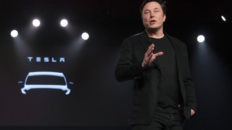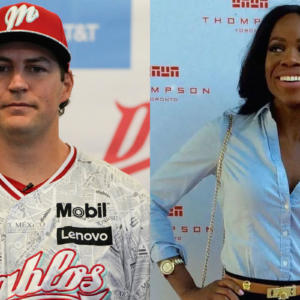There must be some sort of internal human instinct that kicks in when you reach billionaire status that makes said human develop an insatiable urge to fly into space.
Now granted, it’s hard to have ambitions of orbiting a different galaxy or solar system with limited funds, but the list is long of big name billionaires that long for a long trip to Mars, or some other non- earth destination.
Elon Musk is at the top of the list, of course, and it’s a dream he’s had for decades and started to lay the groundwork for 20 years ago when he launched SpaceX. Fast forward to now, and according to the richest person in the world, he feels he’s realistically four years away from launching SpaceX’s Starship on a 125.88 million mile journey to Mars.
If it happens, it would be an uncrewed mission in 2024, and the Starship vehicle would get some warmup runs by going to the moon for multiple missions, starting in 2022.
Jeff Bezos is another uber wealthy business icon fully involved in the race into space. “Do we want to go to Mars? Absolutely,” is what Bezos said at an event at Cape Canaveral back in 2015. “But we want to go everywhere. And if you want to go everywhere, then you need to dramatically lower the cost of space.”
His company, Blue Origin, is trying to make spaceflight available to the masses. In other words, non-billionaires.
Richard Branson is one of those billionaires that seems like he would insist he’s on that first Virigin Galactic mission, whether it’s pointed to the moon, the space station, or Mars.
One of his initial plans was to charge $250,000 per person to fly 62 miles above Earth to experience weightlessness for five minutes.
He’s faced multiple issues with spacecrafts over the years, which has set his timeline of accepting payments of a quarter million dollars per. (If the Virgin Galactic rates have been set at ]at $4,032 per mile, Branson has not said if he plans to charge someone $800 billion to go to the moon.)
A lesser known billionaire is Robert Bigelow, the founder and owner of the Budget Suites of America hotel chain. He founded Bigelow Aerospace in 1999, with the intent of creating habitats in space, which would essentially be houses in space, that would be inhabitable for astronauts on long journeys.
Bigelow Aerospace had said their goal is “to assist human exploration and the discovery of beneficial resources, whether in Low Earth Orbit, on the moon, in deep space or on Mars.”
Facebook founder and CEO Mark Zuckerberg once had incredibly ambitious plans to tinker around the Milky Way. He had partnered with the late astrophysicist Stephen Hawking, and Russian billionaire Yuri Milner, with the intent not to travel to foreign planets, but to explore stars that were light years away from Earth. Their goal was to see if they could locate water.
Zuckerberg and Milner had some far out plans. Not just satisfied with looking for water, they also had a vision to see if they can find life beyond earth.
“It’s quite possible the closest planet that humans could actually live on is orbiting Alpha Centauri, and the only way to know that for sure is to visit close enough to photograph the planet, which is what this project will do,” is what Zuckerberg wrote several years ago on his Facebook page.
Alpha Centauri is the nearest star to earth, but the problem is it’s 4.3 light years away. That’s 25 trillion miles, and Zuckerberg wrote “even with today’s fastest spacecraft, it would take 30,000 years to get there. That’s too long.”
No kidding. Their plan was to create tiny space probes that can travel 20 percent the speed of light, and they figured at a speed of 100 million miles per hour, they could cut that trip down to 20 years.
Google co-founder, and executive chairman Eric Schmidt once helped fund Planetary Resources, a company that planned to use robotic ships to mine asteroids for precious metals. They even had legendary director James Cameron on-board as an investor.
The one fellow billionaire none of the space cowboys just mentioned need to save a seat for if any of their trips get off the ground, is Bill Gates. The Microsoft co-founder just isn’t that interested in sending humans on a trip into outer space, especially when there are so many issues to deal with here on our home planet. Like trying to combat climate change.
While praising Musk, saying “it’s important to say that what Elon did with Tesla is one of the greatest contributions to climate change anyone’s ever made. And you know, underestimating Elon is not a good idea,” Gates also said he’s not much of a fly guy. “I’m not a Mars person,” Gates told Kara Swisher, the host of the “Sway” podcast.
Gates is a little more practical than the big dreamers on this list. He’d rather put his fortune to work helping to make people stuck on planet Earth that live in under-developed companies have better access to life saving medicines.
“I’m not going to pay a lot of money because my foundation can buy measles vaccines and save a life for $1,000. So anything I do, I always think, OK, I could spend that $1,000 buying measles vaccine.”
We can’t have enough people like that staying put here on this planet.


















Add comment